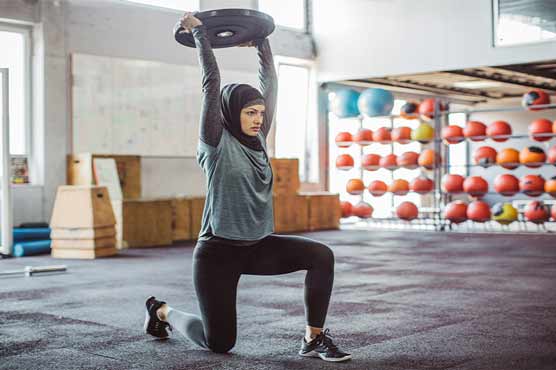Germs At The Gym: How To Work Out Without Worry

Take a shower and rinse off with clean water after going to gym," said Patel.
Islamabad (Online) -- Healthy gym etiquette can help you avoid common germs that can lead to illness. While germs can be contracted at the gym, the risks don’t outweigh the benefits of a good workout. Practicing good handwashing hygiene, covering up cuts and skin breaks, wearing shoes, wiping down equipment before and after use, and bringing your own towels and mats can help keep germs away. Sometimes, it’s hard just to get yourself to the gym.
Once you’re there, the last thing you want to worry about is coming into contact with dangerous germs. In fact, according to a survey of over 1,000 gym-goers, sanitary practices were the respondents’ biggest pet peeves, with the following at the top of their list: More than half of gym-goers witness bathroom users not wash hands and continue using gym equipment.35 percent of men admitted to never wiping down weight machines after using them, while over 25 percent of women admitted to never wiping down cardio equipment.
38.4 percent of gym-goers fail to wipe down equipment in the afternoons while 21.2 percent fail to do so in the late evening.
Staph bacteria Staphylococcus infections and MRSA can live on gym equipment, such as machines, free weights, and mats, as well as on towels, benches, and in locker rooms. “If you want to protect yourself, wipe down the equipment using antibacterial wipes or sprays that gyms provide or use your own towel as a barrier between yourself and the [equipment]," said Patel.
Jason Tetro, microbiologist and host of "Super Awesome Science Show," agreed, but said because people don’t regularly wipe down equipment before and after use, it’s a good idea to take other preventive measures. “Ensure any wounds are covered before you start exercising.
That will help to reduce the chances for skin infection. Do your best not to touch your face after you have touched a surface. This can reduce the chances for introduction of a potential pathogen," Tetro told Health line. Fungal infections Athlete’s foot and jock itch are often caused by a group of fungi called dermatophytes, which can also cause ringworm.
They can be acquired from the locker room environment. “Athlete’s food is caused by fungi that live all over but are associated with moist, damp, wet environments," Patel said. Changing out of wet clothes and then airing them out and washing them when you get home is good hygiene practice, said Patel.
Viruses’ Plantar warts are caused by the human papillomavirus (HPV), and usually develop on the heels or balls of the feet. “Don’t walk [barefoot] on moist, wet environments where it lives.
Take a shower and rinse off with clean water," said Patel. Herpes gladiatorum, also referred to as mat herpes, is caused by herpes simplex virus type 1."It comes from wrestlers back in the Roman days who would get herpes because they were wrestling in close contact with each other," said Patel.

